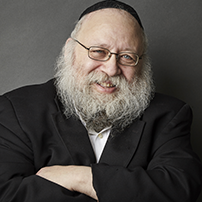
Juxtaposition
As a reward for our commitment to the commandments G-d promises us many things, among them we read the following in this week’s parsha-Ekev:
“You will be the most blessed of all the nations; there will be no infertile male or infertile female among you or among your animals.”
What is the connection between the two parts of this verse? What does being the most blessed of peoples have to do with the absence of infertility?
Listening to Yourself
The Chassidic work Igra d’kalah answers this question by citing a Talmudic statement:
“Whoever has fear of heaven his words will be heard.”
It does not say “people will listen to his words” or “his words will be accepted.” Rather it says, “his words will be heard.” This suggests that not only will others listen to his words, but even he will listen to his own words.
What does that mean?
Occasionally a person will recite the words of prayer but they will not resonate within his body. The words will not radiate because they were recited without fear of heaven, an awareness of and reverence for G-d. By contrast, one whose words of prayer are inspired by fear of heaven they will resonate with others and with oneself as well. The words will penetrate one’s limbs and organs. Igra d’kallah compares the effect the effects of yeast in dough.
Those whose prayer is strictly verbal devoid of light are referred as “nations.” The Hebrew word for nations, amim is cognate to the word omemos, which means dimmed. This individual who is not inspired with his own prayers is allegorically referred to as infertile male. Those who hear this sterile prayer are referred as an infertile female.
Now the verse can be interpreted thus:
“Those whose prayer is suffused with fear of heaven, will be blessed more than others who lack fear of heaven and whose prayers will remain cold and dim.”
The verse continues:
“…there will be no infertile male or infertile female among you or among your animals.”
The Hebrew word for “among you-becha” consists of the two letters beis and chopf-equaling 22, alluding to the 22 letters of speech. Your words of prayer will not be infertile in terms of its effect on you and not be infertile in terms of its effects on others.
Moreover, even your “animal”, i.e., your animal soul and your involvement with mundane aspects of life will be inspired by the fertile words of prayer.
The problem of compromised inspiration we experience when we pray and the words do not resonate with us can be ascribed to our lack of yiras shamayim-fear of heaven. But the question here is why do we lack fear (or better translated as “reverence”) of heaven?
The Effects of Galus
The answer lies in the state of Galus-exile we are in. Exile is not just a geographic concept, it can also be applied to our soul’s imprisonment in a body and its alienation from our conscious mind.
This may be the deeper meaning of the phrase in Psalm (74:9) which describes the state of Galus: “We see no miracles for us…” The word for miracles can also be translated as “our letters.” In exile we do not see the power embedded in the letters of prayer and Torah because Divine awareness has been compromised snce the destruction of the Bais Hamikdash.
Fertile and Infertile Torah Study
With the approach of the Igra d’kalah, we may propose a variant interpretation of the lack of fertility with respect to our Torah study. This approach is based on the comment of the Baal Haturim that the words “there will be no infertile male or infertile female among you” have the same numerical value as “b’divrei Torah-with the words of the Torah.” In other words, fertility and infertility can also be understood in terms of the effects and vitality of our Torah study. Not only does a lack of fear of heaven adversely affect the quality of our prayers but it also compromises the integrity of our Torah study.
What does fertility mean with regard to Torah?
When we study Torah we must make an effort at discovering new insights in the Torah. (Obviously, these new ideas must be consistent with existing Torah principles). Every piece of Torah knowledge we master must be able to reproduce, i.e., lead to additional knowledge.
This premise will shed light on the enigmatic words of Ethics of the Fathers (6:3):
“He who learns from his fellow, even one chapter, one rule, one verse, one word or even one letter, is obliged to treat him with respect. For so we find concerning David, King of Israel, who learned only two things from Achitophel, and yet he called him his master, his guide and his intimate friend…Now we may infer as follows: If David, king of Israel, who learned only two things from Achitophel, addressed him as master, guide and intimate friend, how much more ought one who learns from his fellow, one chapter, one rule, one verse, one word or even one letter, treat him with respect.
The obvious question here: How can we deduce from David’s respect for Achitophel that even one word suffices to establish an obligation to treat that person with respect. Achitophel taught David two things.
The Ba’al Shemn Tov answers that Achitophel’s two teachings remained sterile; they did not reproduce because he lacked fear of heaven. By contrast, when we learn even one thing from one who has fear of heaven, that one teaching reproduces and proliferates.
Moshiach: The Prolific Torah Teacher
One of the features of the Messianic Age is that we will be exposed to novel teachings of Torah to be revealed by Moshiach. Moreover, Moshiach will teach Torah to all the Jewish people including Moses. This raises a question: How can Moshiach teach something to Moses that Moses doesn’t already know? Wasn’t Moses taught the entire Torah by no less of a teacher, G-d Himself?
The answer is that Torah has no limit. One word or even one letter of Torah can produce new knowledge that was not revealed previously. Moshiach will then show Moses that all of the Torah that he mastered can serve as a springboard for more and more knowledge, like a fountain that constantly gushes forth will refreshing waters.
We can now revisit the original verse and interpret it as follows:
“Those whose Torah study is suffused with fear of heaven, will be blessed more than others who lack this fear of heaven, whose Torah study will remain cold and dim.
The verse continues:
“there will be no infertile male or infertile female among you or among your animals.”
Everyone who studies Torah, teacher or student (metaphors for male and female) will not be infertile. Rather their knowledge will continue to reproduce.


